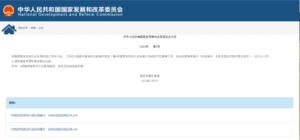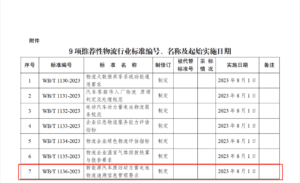On July 20th, the People’s Republic of China National Development and Reform Commission made an important announcement. They revealed that the recommended logistics industry standards revision project plan has reached a significant milestone. The research and drafting of various standards, including “new energy vehicles used power storage battery logistics traceability information management requirements,” have been successfully completed and approved. The eagerly awaited publication of these standards is imminent.

China’s Development and Reform Commission agrees to draft and publish nine new standards
In March 2021, a working group was established under the joint leadership of the Alliance for Compulsory Recycling of Resources (hereinafter referred to as “the Alliance”) and Shanghai Polytechnic University (hereinafter referred to as “SSPU”). Changjiu Logistics, Ganzhou Haopeng Technology, Farasis Energy (Gan Zhou), Zhejiang Huayou Recycling, Guangdong Bangpu Cycle Technology, Xiamen Tungsten, Tianneng Battery Group, Guizhou Zhongwei, Jiangxi Ganfeng Lithium, GEM Wuhan Power Recycling, Luenmei Group Tianjin Battery and other enterprises and institutions participated in the formulation of the Management Requirements.

Implementation of the Requirements for Logistics Traceability Information Management of Used Power Storage Batteries for New Energy Vehicles (WB/T 1136-2023)
A series of enlightening seminars aimed at enhancing the quality of the standard manuscript were meticulously coordinated by the Alliance and the joint drafting group of SSPU and industry-related units from April 2021 to December 2022. Moreover, numerous meaningful offline exchanges and research activities were diligently organized to further enrich the collaborative efforts in this endeavour. The Requirements for Logistics Traceability Information Management of New Energy Vehicle Used Power Battery (WB/T 1136-2023) outlines the essential guidelines for managing logistics information related to used power batteries in new energy vehicles. It covers a wide range of aspects, including the requirements for traceability information, the management of traceability labels, the collection of traceability information, the operation and maintenance of information, and the implementation of traceability services. This applies to the various logistic operations involved in the collection and delivery of used power batteries for new energy vehicles to customers, including loading and unloading, storage, and transportation.

